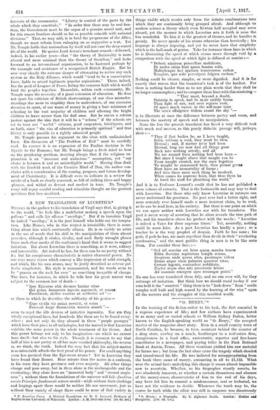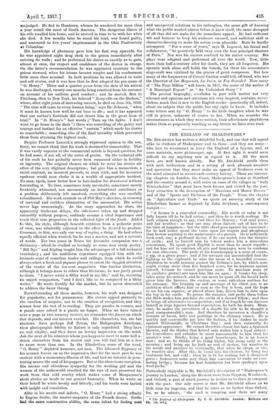"O. HENRY."*
Ier the training of the fiction-writer to his task, the first essential is a copious experience of life ; and few authors have experimented in so many and so varied schools as William Sydney Porter, better known to the English-speaking world as " O. Henry," the accepted master of the magazine short story. Born in a small country town of North Carolina, he became, in turn, assistant behind the counter of a drug store, cowboy on a ranch, bookkeeper to a real-estate firm, draughtsman in a land office, caricaturist, reporter and free-lance contributor to a newspaper, and paying teller in the First National Bank at Austin, Texas. All these vocations yielded him raw material for future use ; but from the last alone came the tragedy which clouded and transformed his life. Ile was indicted for misappropriating front the bank three sums of money, amounting in all to 81,153. What were the actual facts underlying this charge it seems almost impossible now to ascertain. Whether, as his biographer stoutly asserts, he was absolutely innocent, or whether a certain dreaminess and absence of the money-sense, characteristic of him to the end of his days, may have led him to commit a misdemeanour, real or technical, we have not the evidence to decide. Whatever the truth may be, the course he took while the affair was still in suspense was disastrously *0. Henry: a Biography. By C. Alphonso Smith. London : Hodder and Stoughton. [10s. Gd. uct.1
misjudged. He fled to Honduras, whence he wandered for more than a year round the coast of South America. The dangerous illness of his wife recalled him home, and he arrived in time to be with her when she died. A few months later he stood his trial, was found guilty, and sentenced to five years' imprisonment in the Ohio Penitentiary at Columbus.
His knowledge of pharmacy gave him his first step upwards, for he was appointed night drug clerk to the prison immediately after entering its walls ; and he performed his duties so exactly as to gain, almost at once, the respect and confidence of the doctor in charge. On the latter's recommendation he was appointed secretary to the prison steward, when his leisure became ampler and his confinement little more than nominal. In both positions he was allowed to write and sell stories, and it was here that he first adopted his pen-name of " 0. Henry." Three and a quarter years from the date of his arrival he was discharged, twenty-one months being remitted from his sentence on account of his uniform good conduct ; and he moved, first to Pittsburg, then to New York, his beloved " Noisyville-on-the-Hudson," where, after eight years of increasing success, he died on June 5th, 1910. " The time will come to every human being," says Dr. Johnson, " when it must be known how well he can bear to die ; and it has appeared that our author's fortitude did not desert him in the great hour of trial." In " 0. Henry's " last words (" Turn up the lights. I don't want to go home in the dark ") there was something of the gaiety and courage and instinct for an effective " curtain " which made his stories so remarkable ; something also of the final triviality which prevented them from attaining the highest rank.
Despite Professor Leacock's strongly expressed opinion to the con. trary, we cannot think that his work is destined for immortality. That it was vastly superior to the commercial article is beyond question, for he had some, if not all, of the notes of genius. On the technical side of his craft he has probably never been surpassed either in fertility or ingenuity. The original themes on which he wove his stories are often of the very slightest description ; but give him a mannerism, a racial contrast, an inverted proverb, to start with, and his inventive opulence would soon clothe it in a wealth of appropriate incident. No man, again, knew better how to foreshadow his clenoilment without forestalling it. To that, sometimes truly inevitable, sometimes merely freakishly whimsical, not uncommonly an intentional anticlimax or a problem deliberately left unsolved, everything else was carefully subordinated. His work reminds us of Phil May's sketches, in economy of material and ruthless elimination of the unessential. His action never lags unmeaningly. As the story approaches its close, the apparently irrelevant delays, the side-issues taken up and dropped ostensibly without purpose, suddenly assume a vital importance and reach their true proportion in the reflected light of the finale. Added is this, his style, although beneath criticism from a pedantic point of view, was admirably adjusted to the effect he desired to produce. Grammar, to him, was only one way of saying a thing. He had others equally efficient when wanted, for he was a master, and not a servant, of words. For two years in Texas his favourite companion was a dictionary—which he studied as lovingly as some men study poetry, " Bill Nye " and Kipling taught him the advantages of a full technical vocabulary ; and his multiform experience equipped him with the intimate ergot of countless trades and callings, from which ho could always select a fresh and piquant phrase to arrest the sluggish attention of the reader of the ten-cent magazines. One further distinction, although it belongs more to ethics than literature, he was justly proud to claim. "I never wrote a filthy word in my life," said he, resenting an unjust comparison, "and I don't like to be compared to a filthy writer." He wrote frankly for the market, but he never descended to address the baser throng.
Notwithstanding all these merits, however, his work was designed for popularity, not for permanence. His stories appeal primarily to the emotion of surprise, not to the emotion of recognition, and they cannot bear the test of re-reading. They arc puzzles in essence, and a puzzle once solved is a puzzle no longer. When we have turned over a page or two memory revives, we remember the finesse on which that depends, and our interest vanishes. His characters, too, are but shadows. Savo perhaps Jeff Peters, the Malapropian Autolycus, their photographic fidelity to Nature is only superficial. They have no real vitality, and they leave no lasting impression on the mind. Ask the next of his admirers whom you happen to meet to name half-a- dozen characters from his stories and you will find him at a loss to name more than one. In the Elizabethan sense of the word, 0. Henry " depicted humours, not men. The laboured flippancy of his manner leaves on us the impression that for the most part he was content with a momentary illusion of life, and had no interest in pene- trating nearer the soul of his puppets. But to this there is one exception. His intense and chivalrous sympathy for the working girl and the woman of the underworld crucified for the sins of men preserved his work from that cold cruelty which makes some of Maupassant's short stories an insult to our general humanity. When he wrote on their behalf he wrote keenly and bitterly, and his words were barbed with insight and conviction.
Alike in his merits and defects, " 0. Henry " had a strong affinity
to Eugene Scribe, the master-carpenter of the French drama. Scribe ,
had the same constructive ability, the same talent for finding neat Co. [Gs. net.j
and unexpected solutions to his imbroglios, the same gift of knowing what the public wanted almost before it knew itself, the same disregard of all that did not make for the immediate appeal. Ho had sufficient wit and humour to keep his audience amused, and sufficient skill in character-drawing to make his action seem plausible. More he hardly attempted. " For a score of years," says M. Legouve, his friend and collaborator, " he positively held sway over the four principal theatres of Paris." Nor was his success confined to his native country. His plays were adapted and performed all over the world. Now, little more than half-a-century after his death, they are all forgotten. His operatic work alone still holds the boards, for there his consummate stage-craft was vitalized by the genius of great composers. But how many of the frequenters of Covent Garden could tell, off-hand, who was the librettist of Les Huguenots, La Juice, or Era Diavolo ? How many of " The Four Million " will know, in 197, the name of the author of " A Municipal Report " or " An Unfinished Story " ?
The present biography, overladen in part with matter not very relevant and opinions and criticisms not very inspired, contains, never- theless, much that is new to the English reader—practically all, indeed, about its subject that the public has any right to know. It includes some letters sent by " 0. Henry " to his little daughter when he was still in prison, unknown of course to her. When we consider the circumstances in which they were written, their affectionate playfulness makes them as poignantly touching as any letters we have ever read.



























 Previous page
Previous page